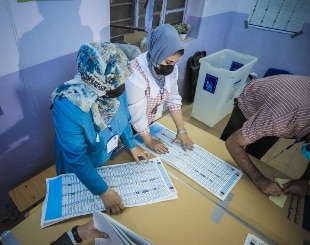Iraq to vote in legislative elections: polling stations closed, turnout low
Share
October 11, 2021Record in negative for the turnout for the elections in Iraq. This was reported by the independent body that oversees the elections. Preliminary results signal widespread dissatisfaction and distrust in this weekend's vote for a new parliament.
The Independent High Electoral Commission said preliminary results show Sunday election turnout was 41%, down from 44% in the 2018 election, which was already an all-time low.
Results are expected today, but negotiations to choose a prime minister to form a government are expected to drag on for weeks or even months. The new parliament will also elect the next president of Iraq.
A total of 3,449 candidates ran for 329 seats.
The elections are the sixth since the fall of Saddam Hussein following the US-led invasion of Iraq in 2003. And they are held with a new electoral law dividing Iraq into smaller constituencies - another request from activists who have took part in the 2019 protests - and allows for more independent candidates.
A UN Security Council resolution adopted earlier this year authorized an expanded team to monitor the elections. Up to 600 international observers will be present, including 150 from the United Nations.
Calling the elections one year in advance is a concession to the 2019 youth-led protests, during which more than 660 protesters died. In the following months, dozens of anti-government activists were reportedly killed, kidnapped or subjected to intimidation, violence often attributed to the influential pro-Iranian factions.
The chances of remaining in power for the prime minister, Mustafa al-Kadhemi, are unclear. To elect the 329 members of the Iraqi parliament, a new system of single-member constituencies was established which, on paper, should favor independent candidates, in a country where political representation often follows religious, ethnic and sectarian lines of belonging. However, many activists linked to the protest movement have called for deserting the polls.
Analysts therefore believe that traditional parties should be able to maintain their grip on a country in which a third of the population lives in poverty despite abundant hydrocarbon resources.
A close race is expected between al-Sadr's list and the Fatah Alliance, led by paramilitary leader Hadi al-Ameri, who finished second in the previous elections. The Fatah Alliance is made up of parties affiliated with the Popular Mobilization Forces, an umbrella group of mostly pro-Iranian Shiite militias that rose to prominence during the war against the Islamic State's Sunni extremist group. It includes some of the more hardline pro-Iranian factions, such as Asaib Ahl al-Haq's militia.
Al-Sadr, a nationalist leader, is also close to Iran, but publicly rejects its political influence.
In Iraq's Northern Kurdistan Autonomous Region, the race is dominated by the two main Kurdish parties known as the Kurdistan Democratic Party, which dominates the Kurdish government, and the Patriotic Union of Kurdistan.

